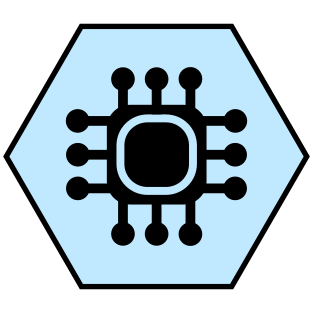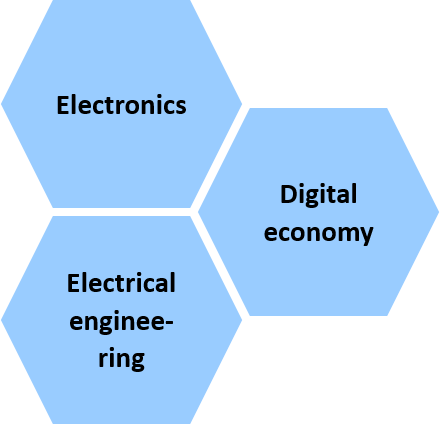The aim of the Electronics and Digital Technologies specialisation domain is to ensure the international competitiveness of businesses in a number of industries in the Czech Republic.
The domain is included under the Digital Technologies and Electrical Engineering thematic area.

Why are electrical engineering and digital technologies included among the RIS3 priorities?
- The fields of electrical engineering and digital technologies have been developing dynamically.
- The Czech Republic has a strong knowledge base in computer science, cybernetics, informatics and mathematics, as well as in physical sciences.
- Almost every innovating enterprise is striving for a higher level of digital technology use, so there is a sufficient absorption capacity.
- Electronic and optoelectronic components are used in a wide range of manufacturing processes
- The principles of the collaborative economy are expanding in society. This means that ensuring an adequate supply of products and services is necessary for its proper functioning
- Cybersecurity threats have been growing.
Application sectors in the thematic area
The Digital Technologies and Electrical Engineering thematic area includes two application sectors:
- Electronics and electrical engineering
- Digital economy
Strategic theme for research and innovation in application sectors - Electronics and Electrical Engineering
Electronic devices and instrument subsystems with high added value
Electronics and related technologies have not played a dominant role in the Czech industry, but they have survived global competition and are currently becoming scarce on global markets (such as the car chips). Therefore, their development may be crucial for the sustainability of the Czech industry. Combined with traditional skills in engineering, completely new application areas are opening up. These include new electronic and optoelectronic components, new areas of micro- and nano-mechanics, and the development of new materials for additive manufacturing with applications in electronics and electrical engineering. These new technologies may be decisive for the competitiveness of Czech industry’s products on world markets.
Electrical engineering and digital technologies for Industry 4.0
The electric and electronic sectors are one of the most stable pillars of the Czech economy thanks to its wide portfolio of end customers and other manufacturers for which it serves as a subcontractor. These include streamlining industrial processes, introducing predictive maintenance, making data available to the digital twin, autonomous control and reducing the risk of failure. It is a field with ever new principles and applications. Therefore, its development is promising. As the Czech economy is based on industrial production, the development of robotics is of enormous importance for the Czech Republic. This will solve the shortage of human resources, increase efficiency, process stability while also reducing defective production.

Strategic themes for research and innovation in the application sectors - Digital Technologies
Advanced computing systems
This theme deals with methods of information processing and the means that can be used for this purpose The area of interest ranges from the study of the properties of information, algorithms, languages and computational and information processes to the practical issues of implementing computing systems in terms of both software and hardware. Without intensive research support and development, the application potential of artificial intelligence, computer graphics, computer security, theoretical computer science, and database systems and software engineering cannot be further developed. This is a relatively new area where many Czech businesses are at the world level and this area offers completely new applications in traditional Czech industry. However, what is important is the level of knowledge and work, and because of that, it is necessary to assign a high priority to the development of this field, as it will significantly help to shift the production of the entire economy. Otherwise, the competitiveness of production and output in the Czech Republic could be reduced, as both EU countries and other international market players are aware of the importance of data and are investing funds in research, support and education in this field. All themes include the required software development.
Application of HPC
The use of high-performance computing (HPC) is a pre-requisite for the digital transformation of our society. It is a driving force for a data-driven economy, with the potential to enable key methods and technologies such as artificial intelligence, data analytics, numerical simulations or cyber security to seize the potential of big data processing or the realisation of challenging complex computational simulations (such as the digital twin technology). HPC provides many sectors with the opportunity to innovate and move to more valuable products, processes and services, which is also a preparation for the development of new industrial applications together with other advanced digital technologies. HPC applications and infrastructure are essential in almost all areas of research, from basic physics to biomedicine, as they enable deeper scientific understanding and breakthroughs. It is also an essential tool for designing solutions to major societal challenges, from climate change to smart and green development and sustainable agriculture to personalised medicine and crisis management. HPC makes it increasingly possible to replace the experiment phase, significantly shorten the development process and reduce costs and negative environmental impacts.
Use of artificial intelligence (AI)
Artificial intelligence can be considered the next level of automation. Its application in industry is broad and thanks to its use, we can achieve more efficient production processes, reduce costs and increase competitiveness. Machine learning methods can be used to process image, audio or multimedia data in areas where the level of their use in the Czech Republic is still low: healthcare, material engineering, agriculture and other. The application of AI in institutions and projects for which machine learning methods have not yet been available for capacity or financial reasons. There are also opportunities to exploit synergies with other advanced technologies such as 3D printing, where the use of AI methods will lead to a bigger efficiency and competitiveness.
Applications of quantum computing and technology
Quantum computing speeds up classical algorithms and brings completely new ways to model solutions. The development of this technology is still at its early stage and it is very important to develop it. The most famous example is the use of cryptography, where a properly designed quantum computer can break most ciphers. It can also be used in machine learning due to the ability of a quantum computer to process a large number of numerical operations. This is an area with great potential for the Czech Republic.
Cybersecurity
With the introduction of the Internet of Things, digital technologies are expanding into many areas, connecting billions of devices to the Internet that may have previously operated offline. We must be prepared for this change. The development of new technologies and constant system updates are essential, as it is important that the network infrastructure security testing toolkit takes into account current technologies and current threats. It is important to strengthen network connectivity, to increase the resilience of the critical information infrastructure environment of the connected nodes against Distributed Denial of Service attacks. The growing number and intensity of such attacks represents a significant threat to the Czech cyberspace. It is necessary to develop technologies that will protect against DDoS attacks and provide high-speed cleaning and filtering of unwanted network traffic. The Czech Republic has a lot to build on, from traditional electrical engineering to quantum technologies to cybersecurity with artificial intelligence. All themes include the required software development.

Key enabling technologies in the Electronics and Digital Technologies domain
In this domain, the following key enabling technologies are particularly applicable. Each of them can be used to innovate in all application sectors belonging to this domain, but also in other areas.
- Photonics and micro-/nano-electronics
- Advanced materials and nanotechnology
- Biotechnology
- Advanced manufacturing technologies
- Artificial Intelligence
- Digital security and connectivity
The specific research and innovation themes for key enabling technologies in this domain can be found in Annex 1 to the National RIS3.
More detailed general information on key enabling technologies can be found here.
Themes concerning social sciences, humanities and arts under the Electronics and Digital Technologies domain
The following SSHA themes will be explored and developed in this domain:
- Research on the interrelationships between society, technology and innovation
- Addressing 21st century societal challenges associated with emerging technologies
- Conditions/barriers to the application of innovative technologies and practices
- Security Research
More detailed general information on the themes of social sciences, humanities and arts can be found here.
National Innovation Platform Digital Technologies and Electrical Engineering
National Innovation Platforms are working groups where the entrepreneurial discovery process (EDP) is put into practice.
The Electronics and Digital Technologies domain is the subject of discussions in the National Innovation Platform II - Digital Technologies and Electrical Engineering, where representatives of business, research and public spheres meet; this is known as the Triple Helix model.
Contacts:
Professional guarantor of National Innovation Platform II - Digital Technologies and Electrical Engineering: Veronika Kramaříková, Czech Technical University in Prague, Veronika.Kramarikova@cvut.cz
Secretary of National Innovation Platform II - Digital Technologies and Electrical Engineering: Jiří Knížek, MIT CR, knizek@mpo.cz

